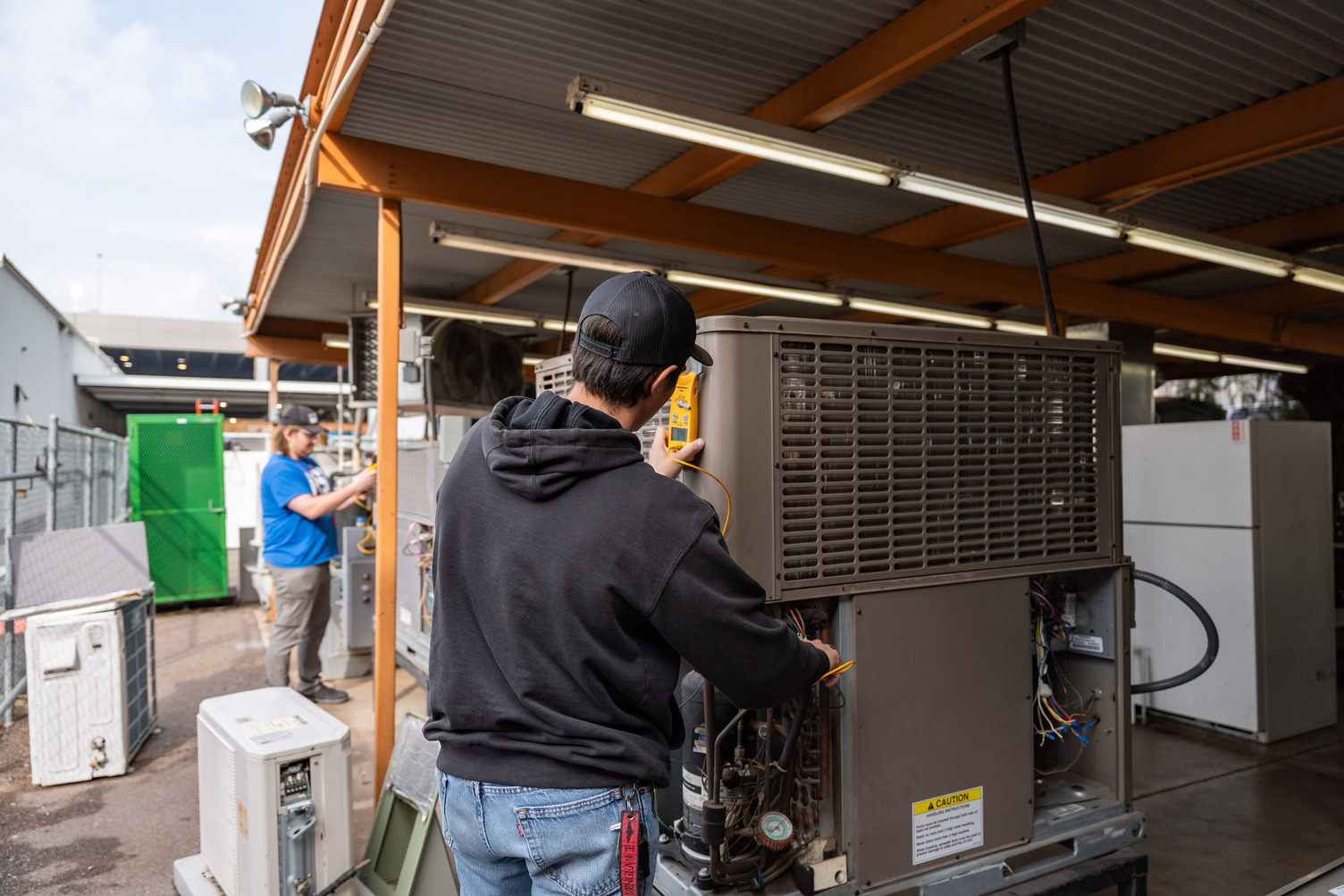RSI is a Great Training Option for Everyone
Learn more about how we can prepare you to advance your career.
AC technician training introduces students to the skills and knowledge needed to service, install, and maintain air conditioning systems. These systems are widely used in residential, commercial, and industrial settings, and technicians are responsible for keeping them operating safely and efficiently.
Programs typically combine classroom instruction with hands-on practice. Students study core HVAC concepts including the refrigeration cycle, electrical wiring, air flow, system diagnostics, and safe handling of tools and refrigerants. The goal is to prepare graduates to have long, successful careers in the HVAC/R industry.
Depending on the program, students may also be introduced to current technologies such as smart HVAC systems and energy-efficient system designs. Programs are often structured to support a range of experience levels, from beginners to those seeking additional training.
Why Consider Becoming an AC Technician?
Air conditioning systems are a part of daily life across homes, businesses, healthcare facilities, and more. The demand for HVAC technicians continues to grow* due to rising temperatures, population growth, and the adoption of modern, energy-efficient technologies.
AC technician training can lead to steady job prospects and long-term career growth. Technicians may work in installation, service, or maintenance roles and often have opportunities to specialize in areas such as commercial HVAC, refrigeration, or advanced systems.
Get Started on the Path to a New Career
Fill out our form to learn how we can help you change your life.
Many professionals in this field appreciate the hands-on nature of the work and the problem-solving it involves. Whether repairing a home system or troubleshooting an industrial unit, AC technicians often find satisfaction in seeing the results of their efforts.
What Training Do You Need to Become an AC Technician?
Becoming an AC technician begins with a comprehensive AC technician classes program that covers both technical knowledge and practical application. Topics typically include refrigeration systems, electrical circuitry, system diagnostics, and safe workplace practices.
A central requirement for most technicians is the EPA Section 608 certification. This credential is required for those handling refrigerants and is included in many HVAC training programs. Students may also pursue additional certifications depending on the type of systems or specialties they plan to work with.
Programs such as the Refrigeration Technologies program at RSI are structured to help students prepare for entry-level work and obtain relevant certifications. Training often includes exposure to residential and commercial HVAC equipment in a lab environment that mirrors real-world conditions.
Core Areas of AC Technician Training
A quality AC technician program focuses on preparing students with job-ready knowledge and skills. Key areas of training include:
- Refrigeration systems: Understanding how heat transfer and the refrigeration cycle apply to air conditioning systems.
- Electrical fundamentals: Learning how to read wiring diagrams, use diagnostic tools, and safely troubleshoot electrical components.
- System maintenance and repair: Performing basic tasks like filter replacement, coil cleaning, and leak detection.
- Safety practices: Following OSHA and EPA standards to work safely with tools, equipment, and refrigerants.
- Hands-on lab work: Applying classroom concepts to real equipment in controlled environments, under instructor supervision.
Some programs may also introduce students to smart system controls and energy-efficient technologies to prepare for the changing landscape of HVAC work.
Advantages of Formal Training
Formal training programs offer a structured path into the HVAC industry. In addition to building technical competence, they provide access to experienced instructors, up-to-date equipment, and opportunities for certification.
Benefits of professional AC technician training include:
- Instruction from professionals with industry experience
- Practice with tools and systems found in the field
- Coursework aligned with current industry regulations
- Built-in preparation for certifications, such as EPA Section 608
Graduates often enter the workforce with greater confidence and a clearer understanding of what employers expect from entry-level technicians.
Choosing the Right Training Program
When selecting a training program, consider factors such as curriculum, accreditation, schedule flexibility, and student support services. A strong program should combine theoretical instruction with hands-on training and support students through the certification process.
Programs like the Refrigeration Technologies training at RSI are built to help students meet employer expectations. With industry-relevant labs and a focus on real-world skills, these programs aim to prepare students for success in a range of HVAC roles.
Prospective students may also want to ask about job placement services, graduate outcomes, and employer partnerships to better understand how the school supports career development.
Career Options After Training
After completing a training program and earning necessary certifications, AC technicians can pursue a range of job opportunities. These may include:
- Residential HVAC installation and maintenance
- Commercial system service and repair
- Refrigeration system work in retail or food service settings
- Specialized roles in smart system integration or energy-efficient retrofitting
Technicians may choose to focus on a specific area of HVAC or pursue additional training to expand their scope of work. Over time, some technicians move into supervisory positions, open their own service businesses, or continue their education to work in engineering or system design.
Want to Learn More?
If you’re interested in becoming an AC technician, the Refrigeration Technologies program at RSI offers training designed to help students gain the skills and certifications needed to get started in the HVAC industry.
To learn more about enrollment, program options, or class schedules, contact RSI or call 1-855-935-0486 today.
*Employment is expected to grow for Heating, Air Conditioning, and Refrigeration Mechanics and Installers (499021) in the U.S. from 441200 to 481300 jobs through 2033 in AZ from 9140 to 10810 jobs through 2032. https://www.careeronestop.org – sponsored by the Department of Labor, www.bls.gov, reported as of May 2024. Data pulled April 2025. Visit https://www.rsi.edu/oes for specific details and data backups.




